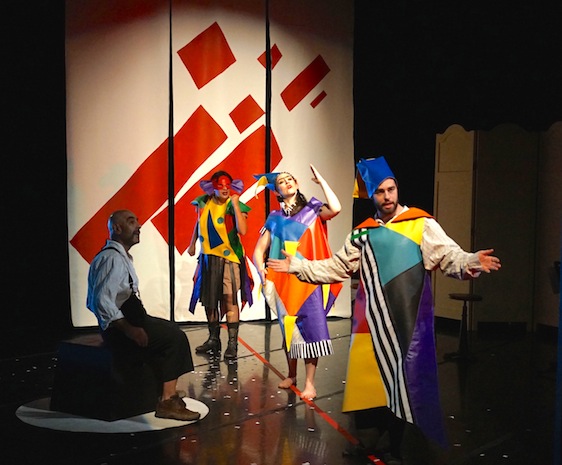
Absurdly yours …
The 2014-15 performance season seems to mark an annus mirabilis for Russian writer Daniil Kharms. This past fall Cal Performances presented Robert Wilson’s The Old Woman, an exploration of the writer’s short stories and named after Kharms’ story of the same name, and this past weekend Erling Wold presented his vision of the absurdist writer in his most recent opera UKSUS (or, in a Roman version of the Cyrillic, YKCYC).
I wouldn’t say Wold has a corner on absurdist opera in the Bay Area, but he’s certainly sitting at the central table in the restaurant. Among his other operas have been The Little Girl Dreams of Taking the Veil, based on surrealist Max Ernst’s collage novel, and Mordake, an opera that took its central metaphor from the story of an English aristocrat who was born with a face – a talking, evil-twin face – on the back of his head. His other operas, Sub Pontio Pilato and Certitude and Joy, have looked at the marginal in religion, the point at which belief becomes transgressive and murderous.
Behind all of these operas lies an incisive intelligence that focuses in on the contradictions of the institutional and the established in culture, holding up a mirror through which we see ourselves darkly.
UKSUS is no exception. Kharms was among those brilliant and tortured artists of the first half of the 20th century that found themselves at odds with their culture and who used their art as a form of criticism and self-defense against the established powers. Absurdity and the ridicule implicit in its sentiment were their weapons. In Europe the art appeared as dada and surrealism and was found were – Ernst, among the practicing artists. But Kharms struggled under the more rigid and brutal totalitarianism of Stalinist Russia. Constantly at odds with the government, accused at one point for “literary hooliganism”, he was arrested on suspicion of treason in the summer of 1941. He was imprisoned in the psychiatric ward at Leningrad Prison and died in his cell in February 1942 at the age of 37.
Wold’s interpretation of Kharms’ life would have delighted its source. In four madcap scenes, Kharms – under the name of Pushkin, the Russian Romantic poet who was under surveillance by the tsarist police, at times unable to publish, and who likewise died at the age of 37 – enacts his life and his stories. Pushkin/Kharms was fetchingly acted by Duncan Wold, who is a member of the theater/arts collective PianoFight.
There goes that old lady again: falling out the window, over and over! And here come the amazing OBERIU, Kharms’ avant-garde collective of Futurist writers and artists. Costumed, dazzlingly, in brightly colored vinyl cut into geometrical shapes designed by Laura Hazlett and frolicking in front of Malevichian sets of red shapes on white canvas designed by Lynne Rutter. A geometric poster of a woman’s face, with Erling Wold spelled out in bold sans serif Cyrillic, acts as both a prison and a prop to the players.
Soprano Laura Bohn enacted the role of Fefjulka, Pushkin/Kharms’ wife, with wonderful comic mugging out of which flowed her strong and nuanced voice. She was partnered wonderfully with mezzo-soprano Nikola Printz as the representative state, Mother Russia, or the Man of Steel himself, in paste-on moustache and khaki wool overcoat, underneath which she sported an indigo-colored corset and laddered stockings. Both women had terrific voices and unerring comic timing.
And the band … ah, they were fabulous in Wold’s collision of serialism and Weill and …
Roham Sheikhani played M2, a slightly ominous as well as anonymous figure who is the tripwire for the players. In the program notes Roham is described as an actor, poet and playwright: “During his lifetime, Roham often used art to hide”, a practice he continues in UKSUS. The whole stew was seasoned by Jim Cave, the director, who also is the play’s narrator, describing himself as “A Samovar” and decked out in shabby top hat and tails.
The libretto is by Yulia Izmaylova and Felix Strasster of the German theater company, VADA. Is there a plot? Not really. Does there need to be a plot? Not really. It was all immensely entertaining and engaging. And an absolute tribute to those in search of their “own place of exultation.”
– Jaime Robles
Photo: Roham Sheikhani, Nikola Printz, Laura Bohn and Duncan Wold in Erling Wold’s opera, UKSUS, based on the life of Russian absurdist Daniil Kharms.
